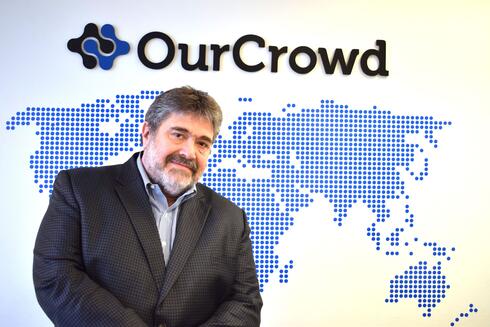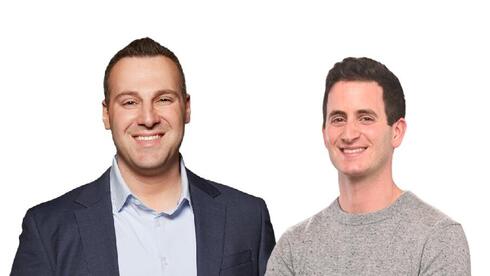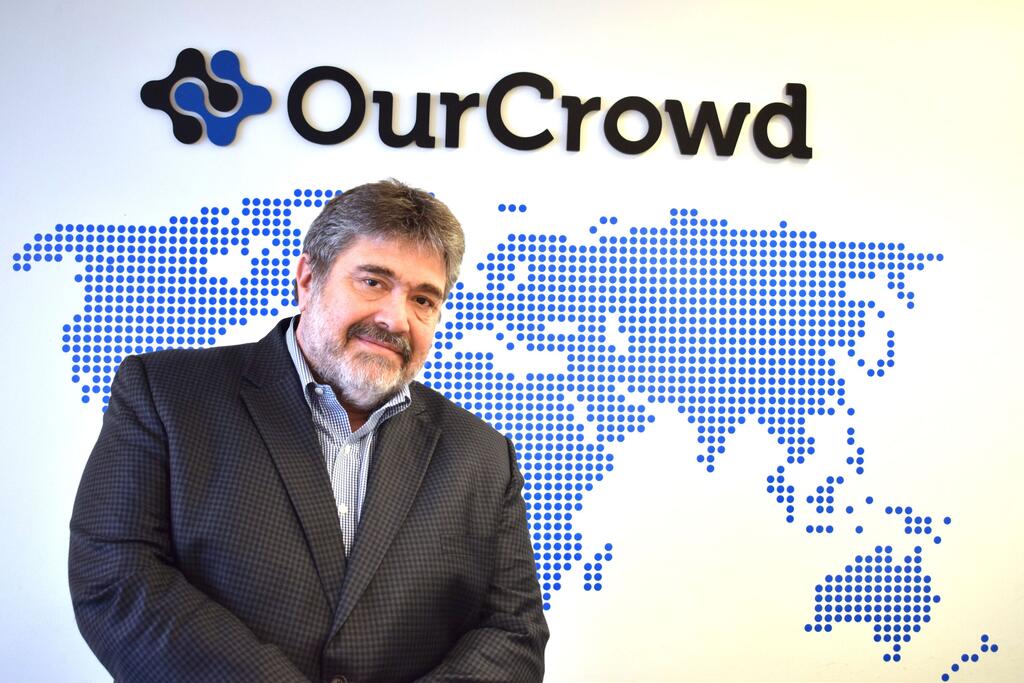
What's next?
"Bull markets are wonderful, but bull markets create sloppy thinking and sloppy performance"
Jon Medved, Founder and CEO of OurCrowd, spoke with CTech as part of the series “Where do we go from here?”, aiming to examine how the Israeli VC industry is dealing with the crisis in the sector
“The fact that international trends in venture have slowed down is not at all good for us. Our entire ecosystem has been based on Israel's role in the international venture funding arena. It's unique that we are so completely dependent and connected to the global ecosystem, and therefore, when international funds drop their activity, it’s a rather scary moment in our business," says Jon Medved, the founder and CEO of OurCrowd in an interview with CTech.
Medved expressed his concerns as part of CTech's on-going project to examine the current state of the Israeli venture capital industry. However, as one of the industry's senior investors, Medved looks far beyond this present crisis, and he is very bullish about the long term. “You ask me what's going to be in a couple of months ‒ I don't know. But by the end of the decade, I'm quite confident that we're going to have this behind us and we're going to be back to the business of not just making lots of money, but also making lots of good things happen for the world on critical issues," he said.
Over recent months, we have witnessed one of the most serious crises to hit Israeli high-tech in recent decades: on the one hand, a global economic slowdown, and on the other hand, a local political crisis that sent the industry into deep stagnation. Since the general assumption is that the situation will not change in the near future, the question is what can still be done to minimize the damage to the Israeli high-tech industry and how should we act so that when the crisis passes - all those involved can take a leap forward. Therefore, as part of this on-going project, CTech is talking with senior executives from the local venture capital industry to try and understand from them what needs to be done now to justify the reputation Israeli high-tech has earned as being creative, adaptive, innovative, agile and cunning.
Name of fund/funds: OurCrowd
Total sum of fund: $2 billion
Partners: Jon Medved, Andy Kaye, Eli Nir, Josh Wolf, Liat Sverdlov, Ofer Shoshan, Ron Stern
Notable/select portfolio companies: Beyond Meat, Lemonade, BioCatch, Honeybook, Hailo
"We're sourcing, maybe as the result of the crisis, better deal flow and better-quality deals than ever before"
How long do you think the global economic slowdown will last?
"Right now, there is a global retrenchment in venture capital investment. Fund managers, and especially entrepreneurs are finding the numbers rather daunting, showing roughly about a 65% drop in allocations from venture funds to companies over the past two years, and in the first quarter alone there was over a 50% drop from the same quarter of last year. So, without doubt there has been a significant drop in venture capital being allocated into companies. There is also a big drop in terms of funding going to new venture funds with some new data showing a 70% drop this year relative to 2022, which was the record year for venture fund raising.
"However, the news is not all bad. Since the beginning of the year, the U.S. stock market, (both S&P as well as the Nasdaq), are now up, even moving into bullish territory. While stocks are up on a narrow base, largely driven by the AI frenzy, they are still up and this may presage a more bullish venture environment later this year since venture trends tend to move along with stocks, but at a 2-3 quarter time lag."
Does the fact that large international funds have generally slowed down the pace of their investments - play to the benefit of the Israeli funds and to the benefit of the local ecosystem?
"The venture numbers in Israel have been similar, with very significant drops. And this is indeed a crisis for startups and a crisis for those who make their living and their business on supporting them. 'But a crisis is a terrible thing to waste,' as Stanford economist Paul Romer once said, and one can now find some really interesting opportunities because prices are down, and those who are bold will, I think, do very, very well in the long run.
"The fact that international trends in venture have slowed down is not at all good for us. Our entire ecosystem has been based on Israel's role in the international venture funding arena both because 80% of funding in our companies has come directly from overseas funds, and probably a similar amount of dollars being invested by overseas LP’s into Israeli venture funds here. It's unique that we are so completely dependent and connected to the global ecosystem, and therefore, when international funds drop their activity, it’s a rather scary moment in our business."
How are you going to fund your portfolio companies and make sure that they survive?
"First, we must work harder than ever. We need to focus on bringing quality investments to our investors. We need to educate them on the fact that in markets like this great companies are built, and these kinds of years later on, become the legendary 'Venture Vintages.' We are hoping that there will be a recovery in the overall venture market. But nobody can predict when that's going to happen. We're hoping that there's a levelling off and we're near the bottom, but no one really knows."
Are there positive signs to the crisis?
"The answer is, yes. Bull markets are wonderful, but bull markets create sloppy thinking and sloppy performance. Valuations have really come down and are becoming more attractive and based on different kinds of multiples that we have not seen in a long time. It's also become an easier time for people to write off their investments, because everybody is doing so. Either write them down or write them off. Down rounds are everywhere. And yet we have a robust and healthy portfolio of over 400 companies that are truly in the game, continuing to fight and build their businesses in a leaner and more focused way. There's also renewed clarity in terms of which sectors for investment are going to work in this market, and I'll tell you the only sector that everyone seems to be over the moon about at the moment is obviously AI."
What are the critical points in which Israeli high-tech was damaged?
"I think the Israeli situation is primarily affected by the international venture situation. Whereas I think the political crisis around the judicial overhaul has had its own negative effect on our local situation, but has it had a massive negative effect on our economy? The vast majority of the damage here has been done by international and global forces. Our overall economy is still growing at a rate of over 3%, which while down from prior years is still very respectable in global terms. Unemployment is only 3.7% which means we still have a tight labor market. While international investors are asking tough questions about what is going on in Israel and we are going to need to spend a lot of time, unfortunately, convincing people that we have a reasonable system of government, a strong democracy, this is something we typically do not want to spend time doing.
"We have indeed witnessed some damage to our very, very positive tech brand. But I do think that if sanity prevails among our politicians and compromises are found, and critical constitutional decisions are made by consensus, then our brand can come back and hopefully come back quickly and strongly. It's going to take some wisdom. What I find more concerning is whether our people are going to have the good sense to work together to keep our arguments at a rational sort of low rumble. Is it now just becoming the new normal that we're going be creating a big storms with an existential crisis environment on every issue and all the time chaos, and if Israel moves into that sort of eternal political crisis with breakdowns every week or even monthly - that can't be good for our innovation and venture business.
"I do believe and hope that Israeli tech is not going to be permanently damaged in the long run. In fact, I think there's a way of looking at what's going on now and saying that Israel will come out stronger because of our focus on deep tech. A lot of the critical challenges now are not just around AI, but around making computers more efficient: the chips and algorithms. All this stuff is in our wheelhouse, areas in which Israel is very strong. So I think that long term, Israel as a source of deep tech strength, will emerge better."
How can you take advantage of this interim period (until the crisis passes) to prepare better for the reawakening when it arrives?
"We've been moving upstream in terms of our own business model. We are working, not just with the quarter of a million investors who are on the OurCrowd platform. We have a unique capability of bringing our investments to a very broad audience and we are continuing to both raise and invest money. We are the most active venture capital investor in Israel for the last ten years according to Pitchbook, and we will probably be so again this year. Okay, while our numbers are not as good as they were in 2021, they are looking and trending to be better than they were in 2022. Our revenue was up, and a lot of our companies are doing well.
"I think that we have benefited certainly by making sure that our companies are becoming more capital efficient and controlling their burn rates. We ourselves have gotten more capital efficient in terms of getting our spending under control. We were doing a lot of advertising before. We're not doing as much of that today. Rather, we are working with a lot of institutions and banks as distributors and with bigger family offices which are showing a renewed and quite important interest in our platform to access good and attractive deals.
"We're sourcing, maybe as the result of the crisis, better deal flow and better-quality deals than ever before.
"We’ve established ourselves as a value-added investor, and people want OurCrowd to join their rounds because of the unique connections and international network we provide and our ability to provide real value to portfolio companies that we have. I think on the back end of this we're going to come out stronger and I think Israel is going to come out stronger.
"In a situation where you're looking at downward venture metrics such as dollars invested or dollars raised by venture funds and you're down 50% to 70% ‒ then it takes a while to come back from that. Therefore, I would not expect a snap-back like we are going immediately back to the go-go days of 2021. I don't think the numbers of 2021, in the midst of the pandemic which provided a real acceleration to digital everything in the digital economy as well as venture capital, will be renewed anytime in the near future."
Do you support the general assumption that AI can rescue the industry from the current crisis?
"I don't think that AI alone can rescue the industry from the current crisis, but it's certainly doing a big part in helping. We are one of Israel’s largest AI investors, investing in close to 60 AI companies and with a huge amount of exposure to AI. We will continue to focus on this space. We're also very committed to impact investing in general such as climate, energy, mobility, and health care. We're excited about our Global Health Equity Fund with our partners at the WHO Foundation. We think that there are many areas that are going to grow and it’s not just AI, but we think that AI is going to have an impact on many different verticals."
What are the critical points in which the Israeli venture capital industry was hit?
"I don't believe that there has been any long-term change in the way the venture capital industry conducts itself. Certainly not enough. Venture could certainly use more innovation in its own business. That is why we built OurCrowd to innovate the way that companies are backed, providing unprecedented access to good deals by democratizing the venture asset class.
"As a person who's been through several business cycles, business is always cyclical. The problem is predicting these cycles which is really hard. Over the last 14 years (with a minor blip in the beginning of the פandemic) we were in a period where many convinced themselves that we were immune to cycles and the only way was up. Okay, 14 years of up and up, and up and always up - and it's all easy, and it,s cheap money, and it's, go, go! People like me with grey hair remember not just 2007 and 2008 before that major market crashes took their toll. People like me remember 2000, and the first internet bubble burst. And some of us, like myself, even remember 1987 which was also a major drop.
"I've seen cycles come, and sometimes the hits are very hard and sometimes the market stays down not just for a couple of months, but for a couple of years or more, but they do eventually come back. I love the business of innovation finance, the practice of developing innovative technology and investing in it, in helping entrepreneurs achieve their dreams and change the world. That's a great business to be in. We're extremely fortunate that it's our national business in Israel.
"You ask me what's going to be in a couple of months ‒ I don't know. But I do know that by the end of the decade we'll look back on this period and say, “Yeah, that was a tough time.” But by the end of the decade, I'm quite confident that we're going to have this behind us and we're going to be back to the business of not just making lots of money, but also making lots of good things happen for the world on critical issues, and Israel will continue to play a leading role. In this, I have no doubt."














